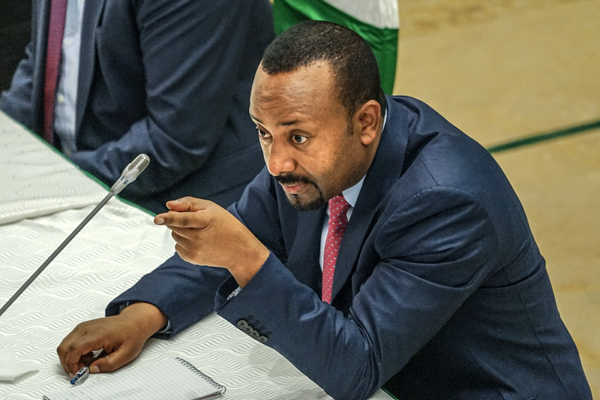Prime
Five things to know about Ethiopia's election

Prime Minister Abiy Ahmed
What you need to know:
- Initially due in August 2020, officials postponed the election because of the coronavirus pandemic, then announced June 5 as the new date.
- Despite the pandemic, Abiy's critics bristled at the extension of his mandate beyond its expiry last October, with some declaring him illegitimate.
Ethiopia's twice-delayed polls are now scheduled for June 21, giving the electoral board less than a month to overcome logistical hurdles exacerbated by war in the north and ethnic violence elsewhere.
It is the first time Prime Minister Abiy Ahmed, winner of the 2019 Nobel Peace Prize, will face voters since his appointment three years ago.
Here are five things to know about the elections:
Why are the polls so important?
Abiy came to power in 2018 when the authoritarian Ethiopian People's Revolutionary Democratic Front (EPRDF) coalition picked him to replace Hailemariam Desalegn, who resigned following several years of anti-government protests.
Despite rising through the ranks of the EPRDF, Abiy took office vowing to reshape politics. He released dissidents from jail, apologised for state brutality and welcomed home exiled groups.
These changes were meant to culminate in the most competitive elections in Ethiopia's history, breaking with previous ones that observers said fell far short of international standards.
Abiy wants backing from voters for his ambitious economic reform agenda.
"He inherited the EPRDF's power, which itself followed from the previous sham election," said Awet Weldemichael, Horn of Africa expert at Queen's University in Canada.
"To truly break new ground, to truly break with the previous order, he needs a new popular mandate to govern."
In June, Ethiopians will choose national and regional parliamentarians.
The national MPs then elect the prime minister, who is head of government, as well as the president, a largely ceremonial role.
What caused the delays?
Initially due in August 2020, officials postponed the election because of the coronavirus pandemic, then announced June 5 as the new date.
However, in April, electoral board chairwoman Birtukan Mideksa said only half the country's 50,000 polling stations were operational and a mere 200,000 people had registered to vote in Addis Ababa, a city of five million, raising concerns about preparedness.
Those figures have since risen sharply.
Just weeks before the scheduled vote, though, Birtukan said it would be impossible to meet the June 5 deadline, citing outstanding tasks such as finalising voter registration, training electoral staff and printing and distributing ballot papers.
Who will participate?
Despite the pandemic, Abiy's critics bristled at the extension of his mandate beyond its expiry last October, with some declaring him illegitimate.
The fiercest opposition came from the ruling party of Ethiopia's northern Tigray region, the Tigray People's Liberation Front (TPLF), which dominated the EPRDF before Abiy took office.
Tigray's government defied Abiy by going ahead with its own unsanctioned elections in September.
Tensions with Tigray erupted into armed conflict in early November after Abiy sent troops to detain TPLF leaders, a move he said was in response to attacks on federal army camps.
Though Abiy vowed the war would be brief, fighting continues more than six months later, making Tigray's participation in the upcoming elections impossible.
Beyond Tigray, inter-ethnic violence has frustrated preparations in other parts of the country, and no voter registration has occurred in parts of the Oromia, Amhara and Benishangul-Gumuz regions.
In late May the electoral board said voting would not take place in 40 constituencies due to issues including insecurity and complaints over irregularities.
Yet the board has said voters in those areas will be able to cast ballots before a new parliamentary session begins in October.
What hurdles remain?
Even in the best of times, organising smooth elections is a tall order in Ethiopia, a vast country hobbled by poor infrastructure.
Diplomats following the process say the electoral board is missing logistical support usually provided by the military, which is largely tied up in Tigray.
The challenges promise to be daunting even with the delay, including the need to hire and train more than 100,000 additional staff.
Ethiopia is also still trying to contain the coronavirus pandemic. It has recorded nearly 270,000 cases - roughly six percent of the continent-wide total - and has only received enough vaccine doses to protect around one percent of its population of 110 million.
Who will win?
Abiy's Prosperity Party has fielded the most candidates for national parliamentary races and is widely expected to secure a new term for the prime minister.
In Ethiopia's most populous region, Oromia, prominent opposition parties like the Oromo Federalist Congress (OFC) are boycotting, complaining their candidates have been arrested and offices vandalised.
The Prosperity Party faces stiffer competition in Amhara region, where the opposition National Movement for Amhara accuses the government of failing to protect Amhara civilians from ethnically-motivated attacks.
The race to govern Addis Ababa is also expected to be close, with the Prosperity Party facing challenges from the Ezema and Balderas parties.
Several high-profile opposition leaders are currently behind bars, including Balderas' Eskinder Nega and the OFC's Jawar Mohammed.




